Capitalism-imperialism, Climate Change, and Savage Global Inequalities
A picture essay from a reader
| revcom.us
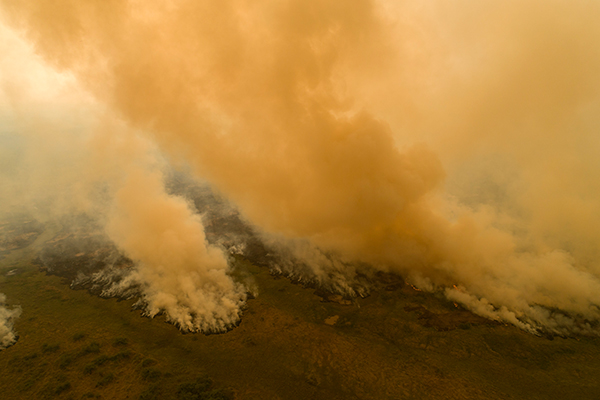
The Brazilian Pantanal suffered the worst wildfires in its recorded history in July and August of 2020. More than 12%, of the area burned in those two months. (Photo: Gustavo Basso/NurPhoto via AP)
Five years ago, countries from around the world came together in Paris, France, in a process dominated by powerful regimes, and signed what was proclaimed as a “historic agreement” that they said would reverse climate change. In reality, the targets set by the Paris agreement were far from what is actually needed. And five years later, not a single large country is on track to meet even those inadequate pledges.
2020 may set a record for average global temperature. The level of carbon dioxide, one of the main greenhouse gases causing global warming, in the atmosphere has risen to 412 parts per million, well above a sustainable level. Sea ice levels in the Arctic reached record lows.
Because the burning of fossil fuels is warming the planet, Earth is facing a cascade of changes that will transform it in ways that will shatter the relative equilibrium of the natural world, as it has evolved over more than 100,000 years, in a matter of years or decades. There is a big unknown about whether countless species, whole ecosystems, or even humanity will ultimately survive this climate change.
All of this is happening because the system of capitalism-imperialism has developed in a way which drives economies to use fossil fuels in the context of relentless competition between different groups of capitalists to maximize profits and between different countries for strategic advantage.
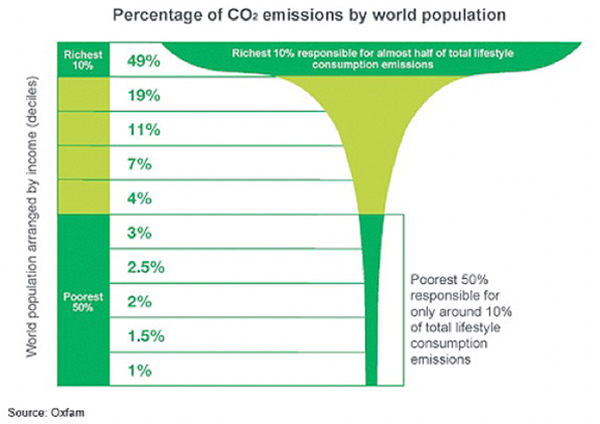
Percentage of CO2 Emissions by country income Source; Oxfam
The devastation and loss of life from climate change does not fall equally on all countries. The 47 least developed countries are responsible for just 1 percent of the world’s total carbon emissions but have borne 69% of climate-related deaths since 1970. It is estimated that in 2020, 20 million people—mainly from the oppressed countries of Central and South America, Africa and Asia—were displaced by climate change.
Climate change doesn't just reflect global inequality but is making it worse. The gap between the economic output of the world’s richest and poorest countries is 25 percent larger today than it would have been without global warming, according to recent research from Stanford University.
Like climate change, these global inequalities are the result of a system which rests on ruthless exploitation of billions of people in large parts of the world by a handful of capitalist-imperialist countries. To put an end to this, we need to make revolution and build a radically new socialist social and economic system, and ultimately a communist world.
Drought, Dry Rivers, and Fires in the Pantanal
Severe drought affected much of South America in 2020. One of the worst suffering is the Pantanal – the world's largest wetlands, spanning Brazil, Bolivia, and Paraguay. The Pantanal is experiencing its worst drought in almost 50 years and suffered record temperatures of more than 113 degrees Fahrenheit in 2020.
Wetlands are a unique ecosystem where the land remains flooded for part of the year, giving rise to unique species. According to a UN report, environmental degradation is more prominent within wetlands than any other ecosystem on Earth. The Pantanal is home to more than 4,700 species of plants and animals, including species facing dangers of extinction like the hyacinth macaw (the world’s largest parrot), jaguar and maned wolf.
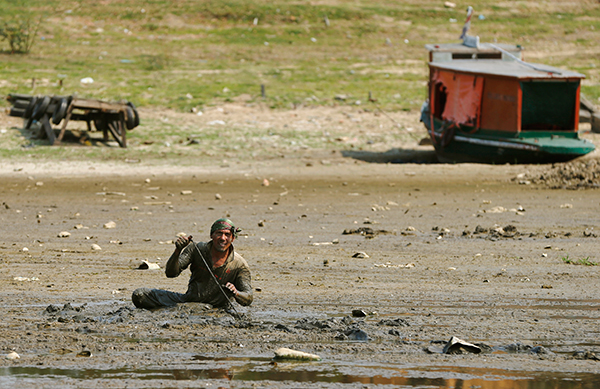
A fisherman searches for eels in the mud of the dried-up Paraguay River on Oct. 8, 2020. The Paraguay River reached its lowest level in 50 years after months of drought. (Photo: AP/Jorge Saenz)
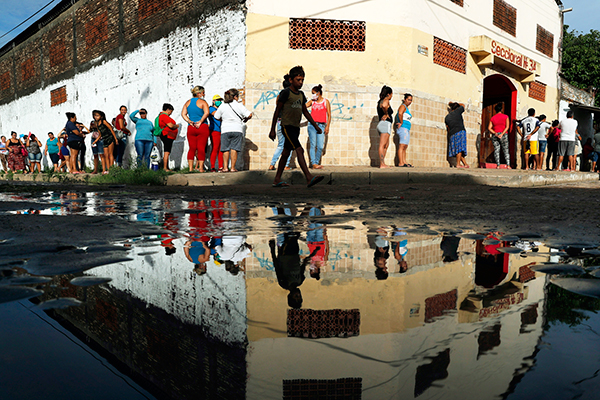
Neighbors line up for free food outside a primary school in Asunción, Paraguay. (Photo: AP/Jorge Saenz)
The Paraguay River reached its lowest level in 50 years in 2020. People are losing access to fresh water and forced to pay higher prices for fuels, and small- and medium-sized farmers are unable to sell their crops.
In 2020 fires in the Pantanal and the Amazon regions have been 46% larger than in 2019 when the fires received some international attention after protests during the G7 meeting of major world powers. The ongoing fires threaten to push the destruction of the Amazon ecosystem over a tipping point of no return.
Like the widespread fires on the U.S. West Coast in recent years, the fires in the Amazon basin were fueled by the drying out of the forest floor, which greatly intensified fires and made them much harder to contain. One difference is that in the Amazon and other parts of South America, the fires are being deliberately set.
While the media often depicts small farmers or landless peasants as responsible for the burning of the Amazon, most of the deliberately set fires are to clear the way for large-scale cattle ranching, cash crops, and, increasingly, marijuana production. These are for export to the U.S. and Western Europe, and much of the trade is controlled or financed by corporations based in these imperialist countries.
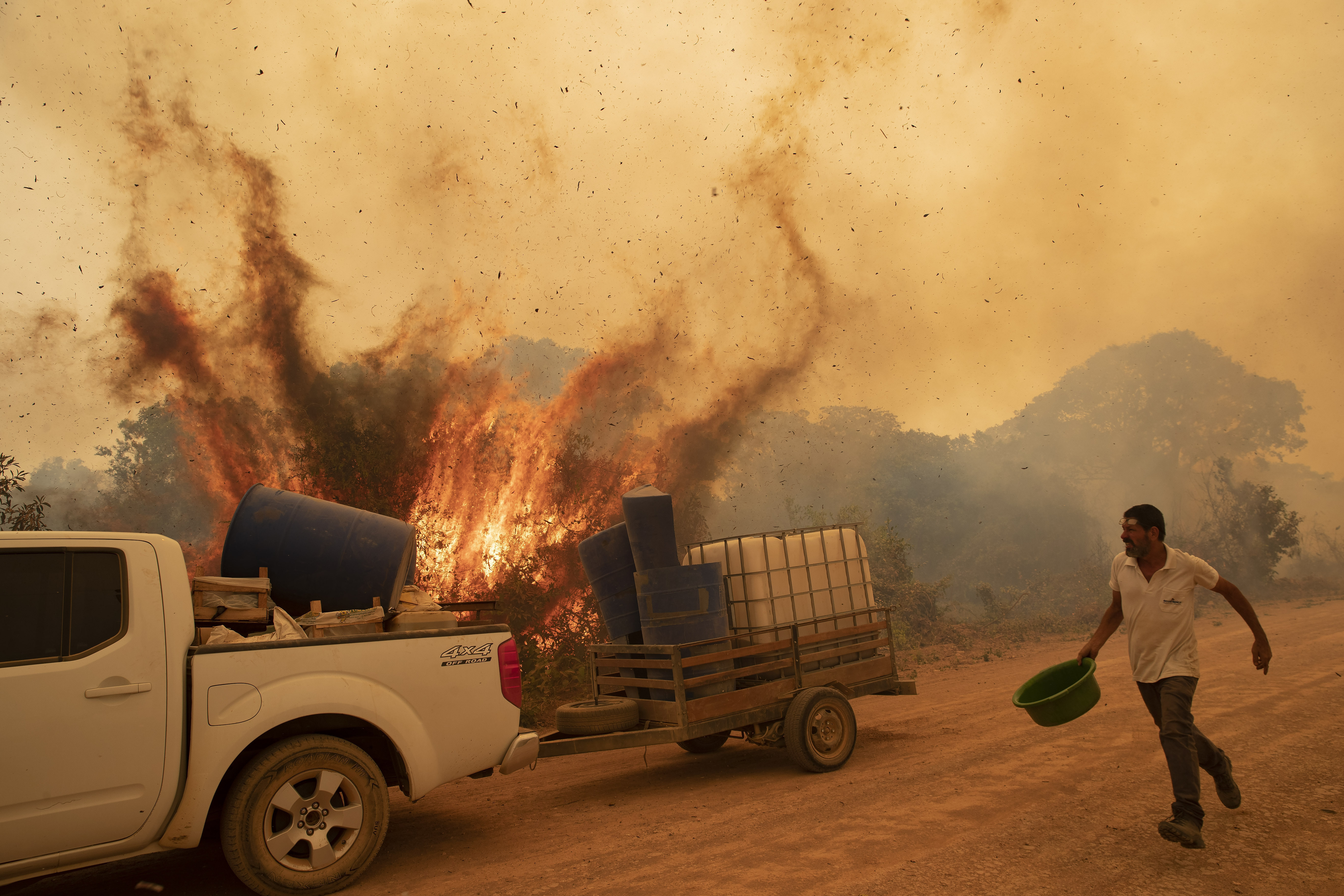
The number of fires in Brazil's Pantanal, the world's biggest tropical wetlands, more than doubled in the first half of 2020 compared to the same period last year, according to data released by a state institute. (Photo: AP/Andre Penner)
Cyclone Amphan in the Bay of Bengal
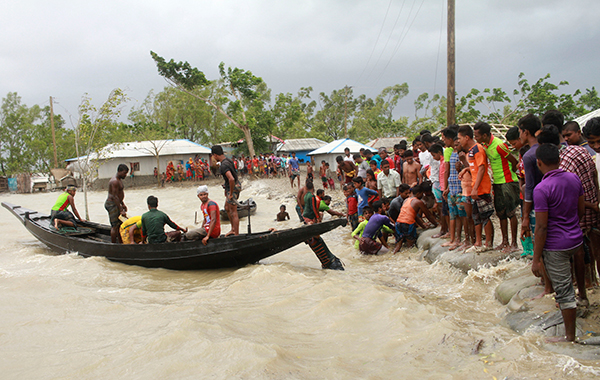
Climate change migrants in Bangladesh after Cyclone Amphan (Photo: Kazi Salahuddin Razu/NurPhoto via AP)
Heavy rain and extensive flooding occurred over large parts of Africa and Asia in 2020. While extreme weather events, such as hurricanes and cyclones, are a part of nature, warmer ocean currents and other effects of climate change lead to larger and more powerful storms.
On May 20, Cyclone Amphan tore into India and Bangladesh with 130 mph winds. It was only the fourth super cyclone to hit the Bay of Bengal in the last 400 years. Amphan grew rapidly in the Indian Ocean, fueled by warm waters of up to 88 degrees F. 2.4 million people were displaced in West Bengal and 2.5 million in Bangladesh. More than 2.8 million homes were damaged.
One of the hardest areas hit was Sundarbans, a grouping of small islands in the delta between India and Bangladesh. The storm destroyed much of the mangrove forests, home to Royal Bengal tigers and other endangered species. Sea water surge has made much of the agricultural land unusable. Sea level rise will displace 18 million Bangladeshis within the next 40 years.
Shyamali Pramanik, a 30-year-old woman who lives at Ghormara Island in Sundarbans, broke down in tears as she was interviewed by the environmental news site Mongabay: “I had left livestock and a mud house before being shifted to a relief camp, but nothing is left now except a collapsed wall with no roof. I sold eggs and livestock for livelihood, but everything is gone. Soon, the rising water and erosion will wipe off our existence.”
Plague of Desert Locusts in East Africa
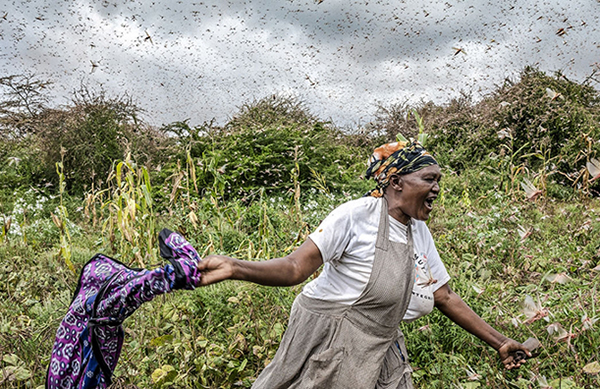
A desert locust swarm in Kenya. Source: United Nations Food and Agriculture Organization FAO. (Photo: FAO/Sven Torfinn)
At the beginning of 2020, heavy rains brought hundreds of millions of desert locusts swarming into Kenya and other parts of East Africa, destroying crops. One locust swarm covered an area that was 25 miles by 37 miles and could eat as much food in one day as 85 million people.
This was the worst locust outbreak in Kenya in 75 years. A second wave of locusts, even larger than the first, overran the area again in June and July. The outbreak continues at the end of 2020.
An Al Jazeera report described a mother of ten children, screaming and throwing rocks at the locusts that descended on her sorghum fields in northeast Ethiopia. But the insect swarms were so relentless that her entire crop – her family’s only source of income – was destroyed. “They never left for a week,” she said. “We are left with an empty harvest … How can I feed my children like this?”
“Global warming played a role in creating the conditions required for the development, outbreak, and survival of the locusts,” scientists from the Intergovernmental Authority on Climate Prediction and Applications Centre wrote in the journal Nature Climate Change.
The United Nations Food and Agriculture Organization says that if the desert locusts continue to swarm, they can pose a threat to the livelihoods of 10% of the world's population.
It Doesn’t Have to Be This Way
This is just a glimpse into what has happened because of climate change combined with global inequalities in the LAST YEAR. Both factors are the products of capitalism-imperialism. This is intolerable! Much worse is coming. The number of climate refugees will grow to hundreds of millions, coastal areas will be submerged, mass starvation will intensify, and extinctions of species will accelerate.
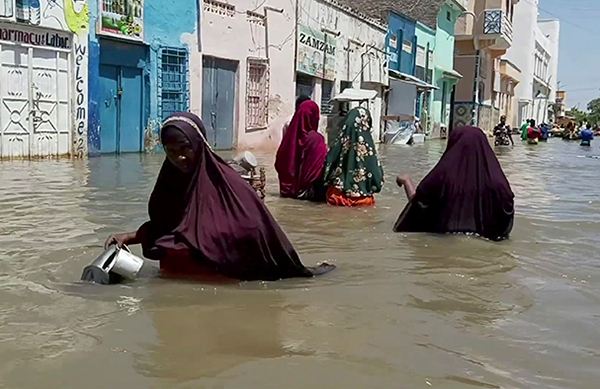
May 17, 2020, people wade through a flooded street in Beledweyne, central Somalia. Flooding in central Somalia has affected nearly 1 million people, displacing about 400,000. (Photo: AP)
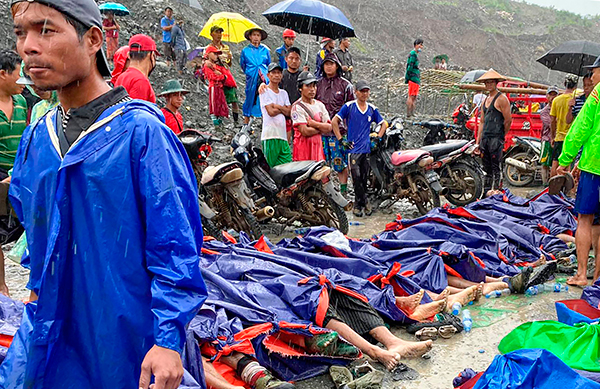
More than 170 people died in a landslide at a jade mine in Myanmar on July 2, following heavy rain. (Photo: AP/Zaw Moe Htet)
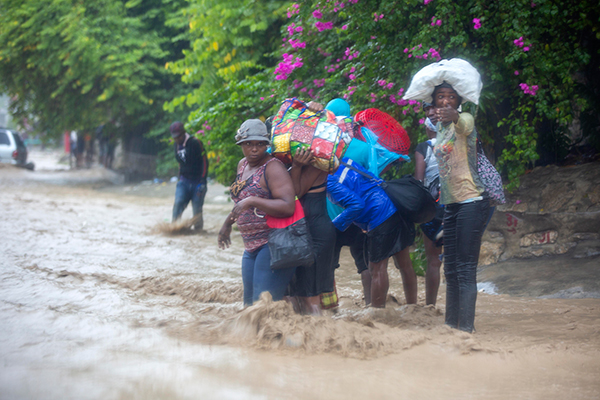
People cross a flooded street during Tropical Storm Laura in Port-au-Prince, Haiti, Aug. 23, 2020. Tropical Storm Laura battered the Dominican Republic and Haiti and hit the Louisiana coast as a hurricane. (Photo: AP/Dieu Nalio Chery
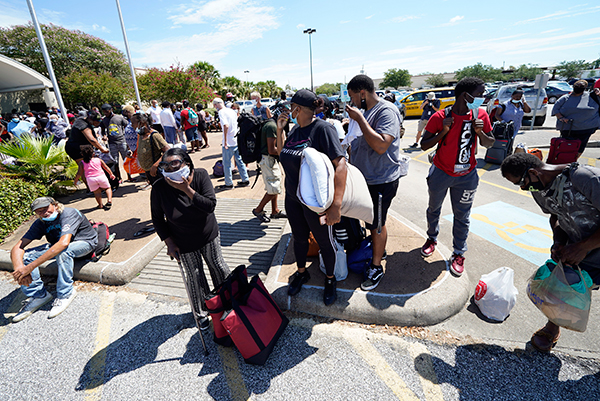
Evacuees wait to board buses on Aug. 25, 2020, in Galveston, Texas as Hurricane Laura heads toward the Gulf Coast. (Photo: AP/David J. Phillip)
Capitalism-imperialism is destroying the planet. In the face of this looming catastrophe, only revolution gives humanity a real chance to save it. We need a radically different society that values nature and builds an ecologically sustainable economy, that values the billions of oppressed people on the planet and unleashes their vast creativity and initiative, one that is working to build a communist world free of all relations of exploitation and oppression.
How Would a Revolutionary Socialist Society Address the Environmental Emergency?
Excerpts from the Constitution for the New Socialist Republic in North America
Some Key Principles of Socialist Sustainable Development
From Revolution special issue:
State of EMERGENCY!
The Plunder of Our Planet, The Environmental Catastrophe & The Real Revolutionary Solution
Read more
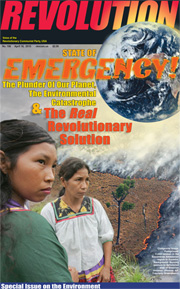
See also:
50 Years Since Earth Day 1: Reflections on the Catastrophe That Is Capitalism-Imperialism
by Raymond Lotta
Get a free email subscription to revcom.us:


